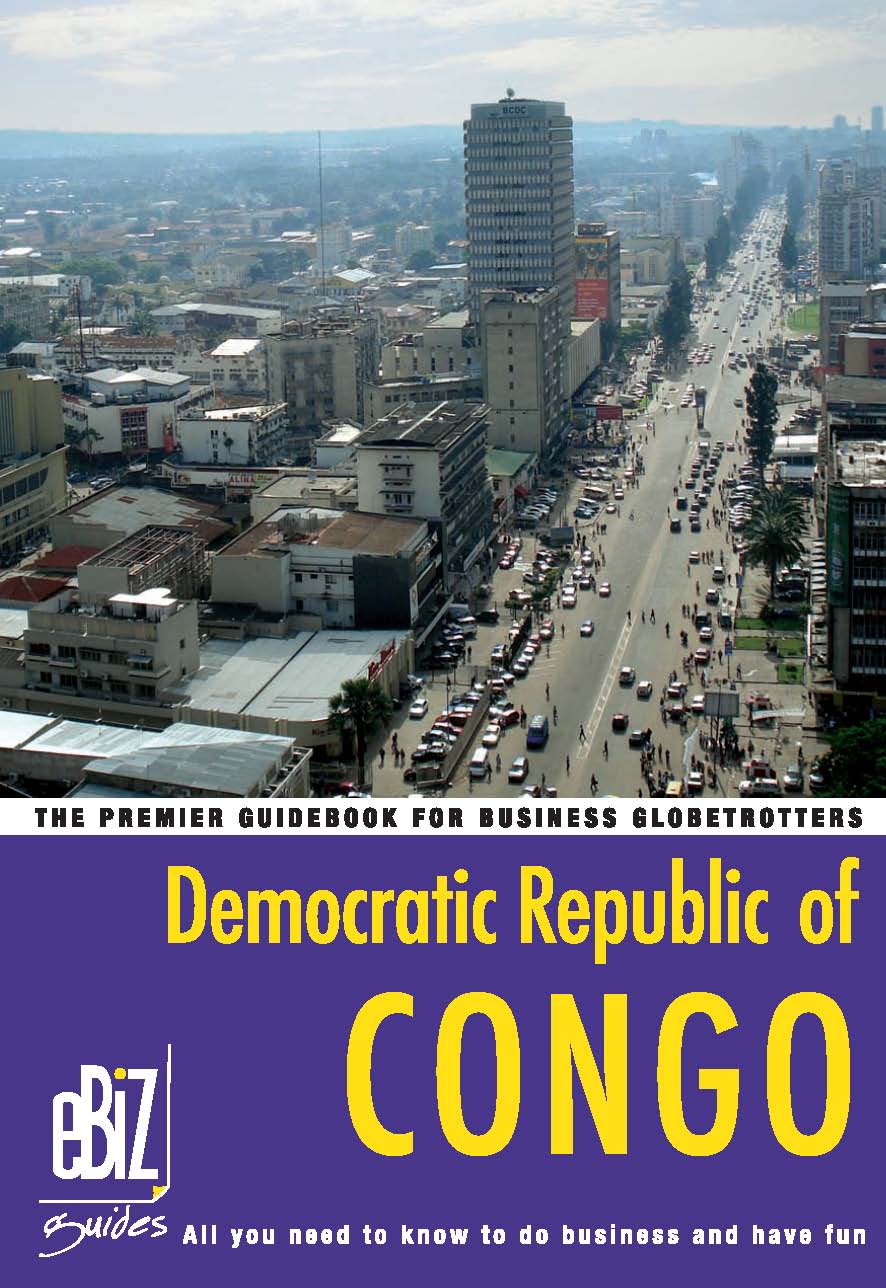Democratic Republic of Congo
eBizguides Democratic Republic of Congo
A country with outrageous potential of natural resources
Le guiaré a lugares increíbles
The concept of eBizguides
eBizguides aims to provide on-the-ground information about the country economic performance, the main investment opportunities and acute business intelligence research about who are the leaders and influencers of the country and which are the top 100 companies. All you need to know about doing business in a country and in a unique publication that also includes a small tourism guide. eBizguides are the world's leading business intelligence guidebooks. Click to read more.
Economic structure
Agriculture is the predominant economic sector of DRC’s economy, representing nearly half of GDP (45%),
while mining accounts 16% of GDP and shows constant improvements thanks to tight reforms and increased exploitation of diamonds and copper. Services’ activities account for 33% of GDP but the sector is in difficulty and is constrained in its development by increased cost of freight and insurance. While at independence
DRC was the most industrialized country in Africa, after South Africa, nowadays manufacturing’s activities are in decay: DRC’s industry is underdeveloped and its revival is not expected anytime soon. The construction sector, contributing to 7.1% of GDP, is essentially concentrated in
the capital.
DRC was the most industrialized country in Africa, after South Africa, nowadays manufacturing’s activities are in decay: DRC’s industry is underdeveloped and its revival is not expected anytime soon. The construction sector, contributing to 7.1% of GDP, is essentially concentrated in
the capital.
Reforms
The recent fiscal and monetary performance of the government’s strategy, kept up by the IMF and the World Bank, as well as some infrastructural investments and efforts to present more transparency and formalisation, already have positive effects on some economic sectors. For instance, production improvements were registered in agriculture and particularly in mining.

Título de diapositiva
Escriba su subtítulo aquíBotón
Título de diapositiva
Escriba su subtítulo aquíBotón
Título de diapositiva
Escriba su subtítulo aquíBotón
Título de diapositiva
Escriba su subtítulo aquíBotón
Título de diapositiva
Escriba su subtítulo aquíBotón
Título de diapositiva
Escriba su subtítulo aquíBotón
Título de diapositiva
Escriba su subtítulo aquíBotón
Título de diapositiva
Escriba su subtítulo aquíBotón
Título de diapositiva
Escriba su subtítulo aquíBotón
Título de diapositiva
Escriba su subtítulo aquíBotón
Título de diapositiva
Escriba su subtítulo aquíBotón
Título de diapositiva
Escriba su subtítulo aquíBotón
Título de diapositiva
Escriba su subtítulo aquíBotón
Título de diapositiva
Escriba su subtítulo aquíBotón
Título de diapositiva
Escriba su subtítulo aquíBotón
Título de diapositiva
Escriba su subtítulo aquíBotón
Título de diapositiva
Escriba su subtítulo aquíBotón
Título de diapositiva
Escriba su subtítulo aquíBotón
Título de diapositiva
Escriba su subtítulo aquíBotón
Título de diapositiva
Escriba su subtítulo aquíBotón
Título de diapositiva
Escriba su subtítulo aquíBotón
Título de diapositiva
Escriba su subtítulo aquíBotón
Título de diapositiva
Escriba su subtítulo aquíBotón
Título de diapositiva
Escriba su subtítulo aquíBotón
Título de diapositiva
Escriba su subtítulo aquíBotón
Título de diapositiva
Escriba su subtítulo aquíBotón
INVESTMENT
Currently the business climate and general environment in the DRC are less than attractive for investors seeking ready-made opportunities. The country has not yet totally broken away from the adverse aftermath of its unstable political history of the early years of independence and some practices still exist that are inconsistent with good governance. This period of political instability has resulted in damage to large parts of the socioeconomic infrastructure. However, there are reasons to expect a good future for the country, since major changes have taken place within the public administration, the magistracy and the tax legislation with a view to reducing corruption, administrative, judicial and tax barriers, and to safeguard respect for private property. In early 2007 new institutions were set up following the democratic elections, which have brought about a relatively stable political era, and the DRC, in association with aid from Bretton Woods institutions and the European Community, can now engage in the process of rehabilitating the socioeconomic infrastructure damaged by wars and plundering.
Democratic Republic of Congo
Despite being one of the biggest countries in Africa with its extensive land area (2,345,000 sq. km), DRC is not particularly well known, largely because its name has been subject to change from the day of its discovery by the West in the nineteenth century by the explorers David Livingstone and Henry Morton Stanley. The latter, who worked for King Leopold II, contributed to the creation of the Association Internationale du Congo (AIC), which later became the Etat Indépendant du Congo (EIC) being under the rule of the Belgian king. By way of trade-off and in order to quell frequent diplomatic incidents over which country the Congo belonged to, an international conference was held in Berlin from 15th November 1884 to 26th February 1885, involving the United States together with 13 European countries, where participants decided on liberty to sail on the Niger
River and trade freedom and free access across the Congo basin. It is also within the framework of this conference that King Leopold II recognized AIC as a sovereign state.
River and trade freedom and free access across the Congo basin. It is also within the framework of this conference that King Leopold II recognized AIC as a sovereign state.
eBizGuides Africa
Angola | Algerie | Burkina Faso Cameroon | Cape Verde
D.R.Congo | Rep. du Congo |Republique de Guinée |
Côte D´Ivoire | Egypt |Ethiopia | Gambia |Ghana |Guinea Bissau |Guinea Ecuatorial
Kenya | Lybia | MoroccoMauritania | Mauritius
Mozambique | Namibia |Nigeria | Rwanda | Sierra Leone | South Africa | Sudan |Tanzania | Togo | Zambia
eBizGuides Newsletter Subscription
Business Intelligence - Africa Top Companies - Investment Opportunities - Leaders Talk
eBizguides Newsletter - subscribe
Welcome to our monthly newsletter !
We are very happy to include you in our emailing list to keep you updated with the hottest business news in Africa.
Please do sent us your comments and news.
Wishing you happiness,
eBizguides Team
Ooops! It seems that something went wrong. Please try again later.


































